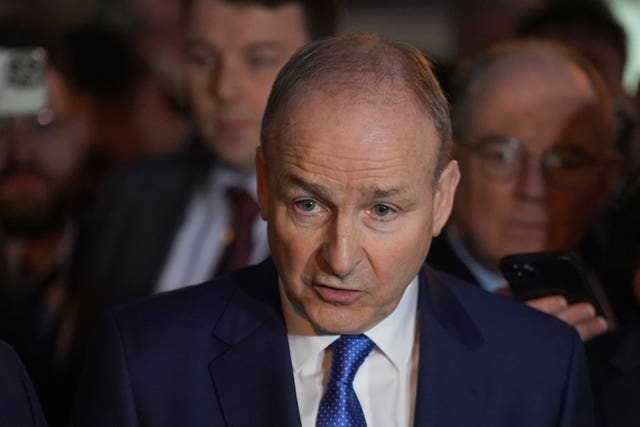Tariffs ‘not conducive’ to economic growth – Irish premier
Mr Martin said it is important for the EU to maintain a ‘positive’ trading relationship with Mr Trump.

The Irish premier has hit back at Donald Trump’s threatened tariffs, saying they are “not conducive” to economic growth.
Mr Trump said he plans to impose 25% tariffs on “any steel coming into the United States”, adding that aluminium will also be subject to additional duties.
Micheal Martin said there will be “some secondary effects” on Ireland if Mr Trump pushes ahead with his policy.
Ireland exported articles of iron or steel worth 61.54 million US dollars (59.6 million euro) to the United States in 2023, according to UN Comtrade data.

Asked about his concerns to the Irish sector over US tariffs, Mr Martin said: “We believe tariffs are not conducive to economic growth. Ireland believes in a free-trade environment.
“We’re a small, open economy, and I believe that free trade has led to the largest rise in prosperity globally in recent decades.
“But in respect of the specifics, obviously there will be some secondary effects in terms of Irish perhaps, but not primary. Again, the European Commission will be engaging with the US administration in respect of trade matters.
“There may be further developments on that front, but that remains to be seen.”
Mr Martin said that Ireland has been a member and participant of the Organisation for Economic Co-operation and Development (OECD) process, and said there should be a “global approach” to taxation issues.
Mr Martin is in Brussels to hold bilateral meetings with the President of the European Parliament, Roberta Metsola, and the President of the European Council, Antonio Costa.
Speaking to reporters, Mr Martin said it is important for the EU to maintain a “positive” trading relationship with Mr Trump.
“I think the US have essentially pulled out of aspects of the OECD agreement, but ultimately, the only way forward is through global agreement,” he added.
“I think more generally, the trading environment is an important one. The trading relationship between the United States and the European Union is particularly significant, one of the largest in the world, and so it’s important that we maintain that positive relationship, which creates jobs in the United States, and, of course, creates jobs in the European Union, including Ireland as well.
“I have full confidence in the (EU) Commission in respect of how we would approach this. We did have some discussions on this last Monday.
“I think it’s important not to react in advance of anything happening. I think the European Union Commission wants to engage with the US presidency and President Trump on these matters.
“There is a lot of interdependence, and the modern world trade is interdependent. Many products to varying components of such products are manufactured in different countries, as we learned during the Covid experience and the vaccine manufacturing experience.
“Up to 50 countries were involved in different components of one vaccine, which illustrates the interdependence, the complexity of supply chains, and I think that’s the area that we will be endeavouring to work with the United States on.”
Mr Martin said that the US and the EU are dealing with a “different approach to conducting relationships”.
“In fairness, there are issues in the United States that were well aired and well articulated during the election there, no more so than across European countries as well, during their respective elections,” he added.
“So in the aftermath of such elections, there is going to be change, and it means the most important thing for us is, how do we respond and adapt to a changing environment. But some of the fundamentals will stay, in terms of economics, in terms of trade and in terms of supply and demand.”





